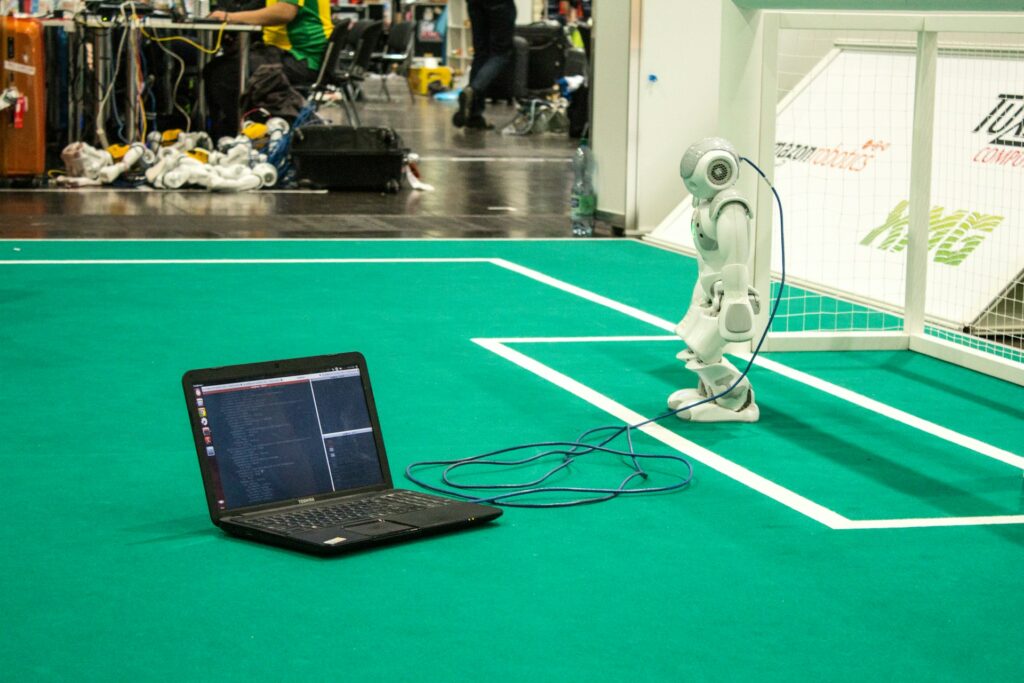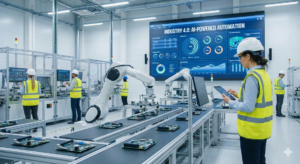Artificial Intelligence in Tools for Remote Work Productivity

Artificial Intelligence in Tools for Remote Work Productivity
Remote work has become a permanent fixture in the contemporary workforce, which has transformed the way that businesses conduct their operations and the way that people work together. Even if there are advantages to remote work, such as more flexibility and convenience, there are also obstacles. These include difficulties with productivity monitoring, communication gaps, and inefficiencies in task management. Artificial intelligence (AI) is becoming more and more integrated into productivity tools in the year 2025, which is assisting remote teams in working more efficiently, remaining organized, and preserving high performance levels. Artificial intelligence is not just automating activities; it is also improving the process of decision-making, cooperation, and workflow efficiency.
How Artificial Intelligence Improves Productivity in Remote Work
Artificial intelligence may be used into productivity tools in a variety of ways:
- Automation of Routine Tasks: Scheduling, email management, and data input are simplified.
- Intelligent Prioritization: Artificial intelligence (AI) examines deadlines and workloads in order to provide recommendations for prioritizing tasks.
- Collaboration Insights: Artificial intelligence is able to recognize patterns in team performance, identify bottlenecks, and determine when workflows are not efficient.
- Assistance with Communication: Language tools that are driven by artificial intelligence (AI) make communications, whether written or spoken, more clear.
Artificial intelligence-powered management of tasks
Artificial intelligence (AI) is currently being used by task management solutions to assist teams in working more efficiently:
- Automated Task Assignment: Based on their talents and availability, artificial intelligence (AI) makes suggestions for which members of the team should be responsible for handling certain tasks.
- Predictive algorithms are used in Deadline Optimization to notify teams when deadlines are in danger of being missed.
- Progress Monitoring: Artificial intelligence (AI) keeps an eye on completion rates and identifies any delays before they really happen.
Communication tools that are intelligent
When it comes to remote employment, good communication is very essential. Artificial intelligence (AI) is improving messaging and conferencing services in the following ways:
- Summaries and meeting notes are generated automatically by artificial intelligence (AI).
- Smart Email Sorting: As it filters out the noise, it prioritizes the messages that are most significant.
- Real-time translation makes it possible for teams to work together across international boundaries without being hindered by language problems.
Improving Concentration and Diminishing Burnout
By studying work habits and offering solutions, productivity tools that are driven by artificial intelligence (AI) may assist in promoting the well-being of employees:
Recommendations for Break Times: These suggestions are provided to help you retain energy and concentrate by taking breaks at the most advantageous times.
Workload Balance: Alerts management to unequal workloads or staff overextension.
Recommendations for Personalized Productivity: Artificial intelligence (AI) provides methods that are based on the work habits and peak performance periods of each person.
- Working Together in a Virtual Environment with the Help of Artificial Intelligence
- Artificial intelligence (AI) makes it easier to collaborate with others in virtual settings.
- Project Insights: Artificial intelligence is used to anticipate any possible problems or delays that may occur throughout the course of a project.
- Document Management: Automatically organizes and tags files to make them easier to access.
- Scheduling Meetings: Artificial intelligence (AI) locates the most suitable times for team meetings while considering the fact that participants may be in different time zones.
Decision-making that is based on the available data
When it comes to making well-informed choices, remote teams may benefit from the insights that artificial intelligence (AI) analytics provide:
- Performance Metrics: This tool is used to monitor the productivity of individuals and teams over a period of time.
- Analysis of Client Interactions: Reveals trends in communication and engagement.
- Workflow Optimization: Proposes enhancements to processes that are based on patterns in the data.
Things to Consider When it Comes to Security and Privacy
Security is of the utmost importance when artificial intelligence (AI) systems are used to manage sensitive business data:
- Data encryption is a method of ensuring that the personal information of employees and customers is kept safe.
- Artificial intelligence (AI) is used in access management systems to check for illegal access and highlight any abnormalities that it detects.
- Compliance Support: Organizations are able to maintain compliance with data protection rules with the assistance of these tools.
Artificial intelligence (AI) tools that are often used for remote work
In 2025, there will be a number of artificial intelligence (AI) elements incorporated into remote work tools, including the following:
- Calendar optimizers and scheduling aids that are intelligently designed
- Project management dashboards that are powered by artificial intelligence
- In communication platforms, there is automated transcription, summarization, and sentiment analysis.
- Virtual assistants that are able to interface with many programs in order to provide a smooth workflow management process.
Issues that Arise with Artificial Intelligence in Remote Work Tools
Even if artificial intelligence (AI) provides a number of benefits, there are still obstacles to overcome:
- Over-Reliance: Critical thinking skills may be diminished by an overdependence on artificial intelligence.
- Integration Issues: Not every artificial intelligence product is able to interface seamlessly with the software stacks that are already in place.
- Learning Curve: Employees may need training to utilize AI capabilities efficiently.
- Cost: For teams that are small or medium in size, the price of advanced artificial intelligence (AI) technologies may be rather high.
The Future of Artificial Intelligence in the Context of Remote Work
The field of artificial intelligence will continue to advance, and the trends that are expected to emerge in the future include:
- Management of the Workflow in a Completely Autonomous Manner: Artificial intelligence (AI) manages complete projects with little human supervision.
- Predictive Collaboration: Artificial intelligence that is able to anticipate the demands of a team before they are ever spoken.
- Heightened Emotional Intelligence: Instruments that are able to identify team emotion and provide recommendations for actions that can raise morale
- Workspaces that are Customized: Artificial intelligence tools and interfaces that adapt to the preferences and work habits of each user.
Artificial intelligence is changing the way that remote teams function by providing instruments that automate activities, improve communication, and generate insights that can be put into action. Companies are able to continue to maintain a high level of efficiency, make improvements to the well-being of their employees, and more successfully handle the problems that come with remote work if they include artificial intelligence into their productivity systems. Artificial intelligence (AI) is no longer only a convenience in 2025; it is becoming a necessary companion for success in remote work.




